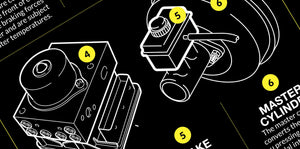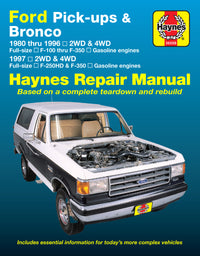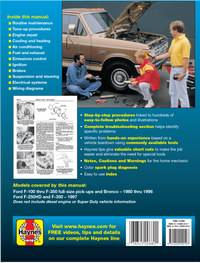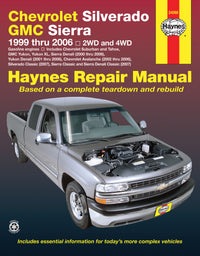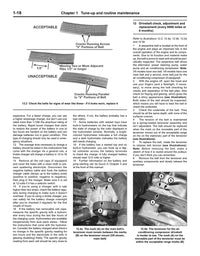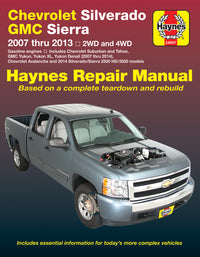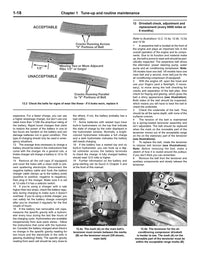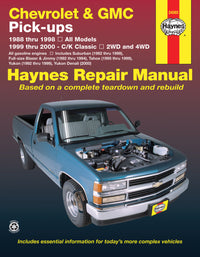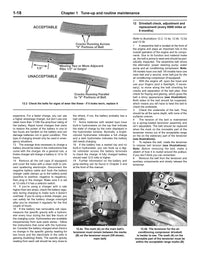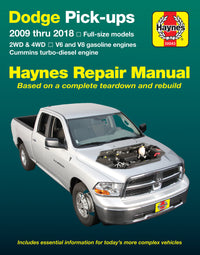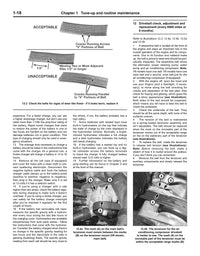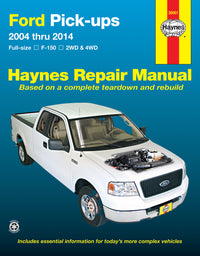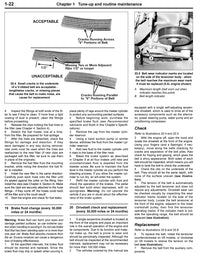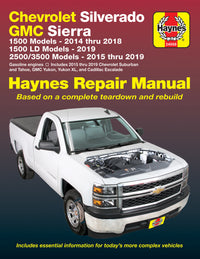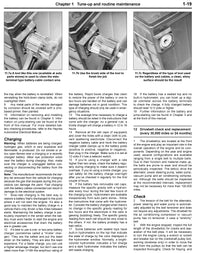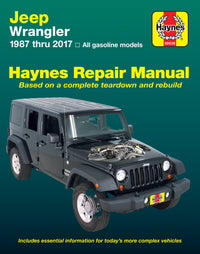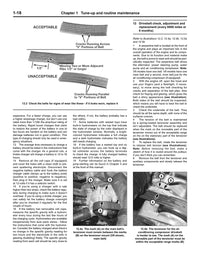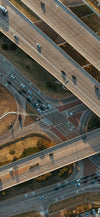Troubleshooting your car's brakes is actually pretty easy, and is simply the result of having the right knowledge combined with an intelligent, systematic approach. And once you've worked out what's wrong, fixing it is often easy with the help of your Haynes manual.
The brakes on your car are probably the most important system, and due to the difficult job they do and how often they are used, they are also one of the most likely to wear and need service. Even when everything is working properly with your brakes, and nothing is worn out, they can suddenly start making disconcerting noises or develop a shudder under use. Modern cars use a power assist (vacuum or otherwise) hydraulic system, with disc brakes on the front wheels, and discs or drums on the back. All modern cars come with sophisticated antilock braking systems (ABS) and brake based stability control, which complicates some aspects of troubleshooting and repair, but those systems will inform you when there is a problem and default to the old, simple system. There is also typically a separate, mechanical parking/emergency brake, either cable or electrically operated, that works only on the rear wheels.

Before we get into the specifics of brakes and their problems, you may want to look at some of the basic rules for troubleshooting in general, as written in the beginning of every Haynes manual: Troubleshooting 101
Much like our earlier examination of clutch issues, there are two general failure modes for brakes: They aren't engaging well enough, or they aren't disengaging. Then there are minor issues such as brake squealing, brake shudder/pulsing, burning smells, leaking fluids, pulling to one side, etc.
Brakes not working well
Even today, your brakes can fail completely, but there are failsafes built into the system to prevent that from happening in most cases. Every car since 1968 has had redundant hydraulic systems, not to mention the parking/emergency brake, to prevent complete brake failure. The master cylinder actually contains two pistons and seals, which in simpler systems controlled the front and back brakes separately, or the diagonally opposite wheels, so at worse you would only lose half your brakes.
Soft Pedal - The brake pedal is easy to push but there is less braking.
- Low brake fluid
- Air in brake fluid
- Bad master cylinder
- Bad caliper/wheel cylinder
- Blown brake line
- Bad residual valve
- Fluid leak in system
- Boiled brake fluid
- Bad wheel bearing
The first thing to check with any brake issue is the fluid level and condition in the master cylinder reservoir. If there is a leak somewhere the fluid level may be so low as to make even the redundant system ineffective. If there is fluid, but it is below the full indication, that may indicate that the friction material on the pads or shoes,or the rotors or drums themselves, may be worn beyond effectiveness.
If there is plenty of fluid in evidence, check if it is hot; repeated hard use, towing, descending a steep hill, or a dragging caliper can boil the fluid. DOT 3 brake fluid should not boil until it gets above 400 degrees Fahrenheit, but old brake fluid that has absorbed water can boil at as little as 284 degrees, which is why it needs to be changed every other year.
Brake hydraulics are a sealed system, so there should not be air in the lines, but if after service you have a sponge pedal that is the most likely cause. A bad master cylinder can introduce air into the lines, as can a failure at a caliper or wheel cylinder. The residual valve (often in the master cylinder or proportioning valve) keeps a small amount of pressure in the brake lines so the pedal doesn't have to travel so far until initial engagement; a failure here can be difficult to pinpoint.
Another uncommon cause of a soft pedal and long travel, is a bad wheel bearing, which is unrelated to the brakes except for being in the vicinity of the rotors. The failing bearing allows the hub to move around, effectively pushing the brake pads back into the caliper as far as it can.
Hard Pedal - It takes much more pressure to get the same amount of pedal travel and braking force.
- Bad power booster
- Vacuum hose leak
- Bad check valve
- Collapsed vacuum hose
- Seized caliper
- Extremely worn brake pads
Most instances of a hard pedal come down to a failure in the power boost system, whether vacuum based or hydro-boost (used mostly on diesels, we won't be covering it here). The power booster uses engine vacuum to assist your leg when applying the brakes, and is nearly universal in modern cars. If it the booster, check valve, or vacuum hose is bad, it will likely also cause a vacuum leak and rough engine idle as well, but an engine with a bad valve or head gasket can also cause low vacuum which can effect the brake boost.
Another cause of a hard brake pedal can be a brake caliper that is stuck or seized. Typically a seized caliper or pads will cause a burning smell, a pull to one side, and dragging at one wheel, but it is possible for it to stick without those, and effectively lessening your braking by nearly half (if it is a front wheel, which provide 75% of the braking). Wearing your pads down to the metal baking plates will also result in a very "wooden" brake pedal as well, as there is not as much friction when it is metal on metal, and they have to clamp harder to slow you down; the horrible grinding noise is usually an indication before the hard pedal.

Brakes hanging up/dragging
The other major way brakes act up is when they fail to disengage completely in one way or another. A common symptom of this type of braking issue is a burning smell from the amount of heat the hung up brake generates. Seldom does this result in a car that won't move at all, but driving with the brakes dragging is unsafe and will result in even more damage in a short amount of time if not repaired.
Some of the cause of brakes dragging on one or more wheels can be:
- Seized caliper/pads
- Seized parking brake cable
- Rusted rotor/drum
- Clogged master cylinder return hole
- Pinched/collapsed brake line
A seized caliper or brake pads that have become jammed in the caliper is probably the most common failure of this type, and can occur due to age, rust, and salt used on winter roads. Luckily, changing a brake caliper is not a hard job, and can be accomplished in about an hour. The same factors can cause cable operated parking brakes to jam up as well, requiring a replacement of the parking brake cable. The way to prevent these issues is to avoid driving in deep puddles, or areas where salt is used on the roads, but if that isn't an option, be sure to clean the wheels and underside of the car often in winter.
Typically rusted rotors or drums only happen when a car has been sitting for a long period. If you are trying to bring a project car back to life, but can't get it to roll, chances are this is the problem.
A clogged fluid return hole in the master cylinder can cause all four wheels to drag, because the fluid sent to the wheels when you press the pedal can't return and let the pressure off. In a similar vein, a pinched hard brake line, or a rubber line that has started to come apart internally can cause the same problem, though localized to one or two wheels.
Other brake issues
- Shudder/vibration/pulsing under hard or repeated braking - This is caused by warped/bent rotors, or sometimes just from a localized buildup of pad material on the rotor surface. Resurfacing the rotors, grinding them smooth and flat again, can fix the issue if it isn't too bad, but often warped rotors got that way because they were overheated, and they will warp again when heated.
- Squealing/howling/squeaking noise - Typically, an annoying high pitched noise coming from the brakes is the metal "wear indicator" tabs, meant to alert you when there is less than 25% of the pad left. Sometimes brakes can become noisy because of a glaze on the pads from stop and go traffic, which can be fixed with a few hard applications of the brakes to clean it off. Finally, because of the different friction materials, manufacturer tolerances, and random wear factors, pads can suddenly start making noise because they resonate in the range they vibrate at during use. Anti-squeal paste tries to fix this by sticking the pad to the caliper piston, raising the resonance outside of this range.
- Sinking pedal - If while sitting at a stop you find the pedal slowly sinking to the floor with your foot on it, you have a master cylinder that is just starting to go bad, or a leak somewhere in the system. But if no leak can be found, it is most likely just one of the rubber seals withing the master cylinder allowing fluid and pressure to sneak by.


